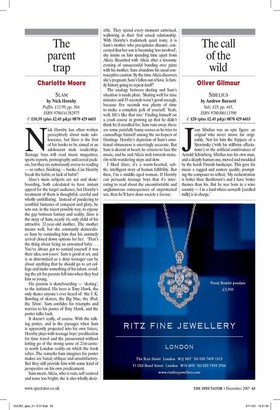The parent trap
Charlotte Moore SLAM by Nick Hornby Puffin, ┬Ż12.99, pp. 304, ISBN 9780141382975 ┬Ż1039 (plus ┬Ż2.45 p&p) 0870 429 6655 Nick Hornby has often written perceptively about male adolescence, but Slam is the first of his books to be aimed at an adolescent male readership. Teenage boys will read music magazines, sports reports, pornography and cereal packets, but they are notoriously averse to reading ŌĆö or rather, finishing ŌĆö books. Can Hornby break the habit, or lack of habit?
Slam's main subjects are sex and skateboarding, both calculated to have instant appeal for the target audience, but Hornby's treatment of them is thoughtful, careful and wholly untitillating. Instead of pandering to youthful fantasies of conquest and glory, he sets out, in the nicest possible way, to expose the gap between fantasy and reality. Slam is the story of Sam, nearly 16, only child of his attractive 32-year-old mother. The mother means well, but she constantly demoralises Sam by reminding him that his untimely arrival closed down options for her. 'That's the thing about being an unwanted baby . . . You've always got to remind yourself it was their idea, not yours.' Sam is good at art, and is as determined as a dozy teenager can be about anything that he should go to art college and make something of his talent, avoiding the pit his parents fell into when they had him so young.
His passion is skateboarding ŌĆö 'skating', to the initiated. His hero is Tony Hawk, the only skater anyone's ever heard of: `the J. K. Rowling of skaters, the Big Mac, the iPod, the Xbox'. Sam confides his triumphs and worries to his poster of Tony Hawk, and the poster talks back.
It doesn't really, of course. With the talking poster, and in the passages when Sam is apparently projected into his own future, Hornby plays with teenage boys' predilection for time travel and the paranormal without letting go of the strong sense of 21st-century north London reality on which the book relies. The remarks Sam imagines his poster makes are banal, oblique and unsatisfactory. But they still provide him with some kind of perspective on his own predicament.
Sam meets Alicia, who is vain, self-centred and none too bright; she is also wholly desirable. They spend every moment entwined, wallowing in their first sexual relationship. With Hornby's trademark quiet irony, it is Sam's mother who precipitates disaster; concerned that her son is becoming 'too involved', she insists on him spending time apart from Alicia. Reunited with Alicia after a tiresome evening of unsuccessful bonding over pizza with his mother, Sam abandons his usual contraceptive caution. By the time Alicia discovers she's pregnant, Sam's fallen out of love. Is family history going to repeat itself?
The analogy between skating and Sam's situation is made plain. 'Skating well for nine minutes and 55 seconds wasn't good enough, because five seconds was plenty of time to make a complete jerk of yourself. Yeah, well, life's like that too.' Finding himself on a crash course in growing up that he didn't think he'd enrolled for, Sam runs away; there are some painfully funny scenes as he tries to camouflage himself among the no-hopers of Hastings. Hornby's depiction of Sam's emotional obtuseness is unerringly accurate. But Sam is decent at heart; he returns to face the music, and he and Alicia inch towards maturity with wandering steps and slow.
I liked Slam; it's a warm-hearted, subtle, intelligent story of human fallibility. But then, I'm a middle-aged woman. If Hornby can persuade teenage boys that it's interesting to read about the uncomfortable and unglamorous consequences of unprotected sex, then he'll have done society a favour.





































































 Previous page
Previous page